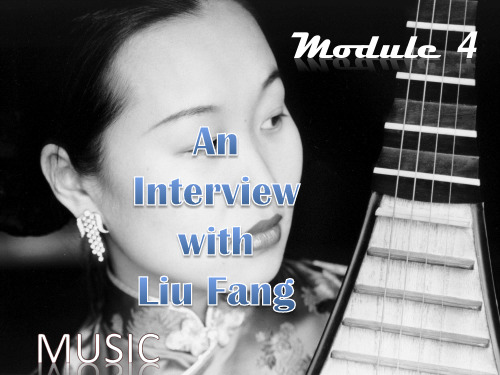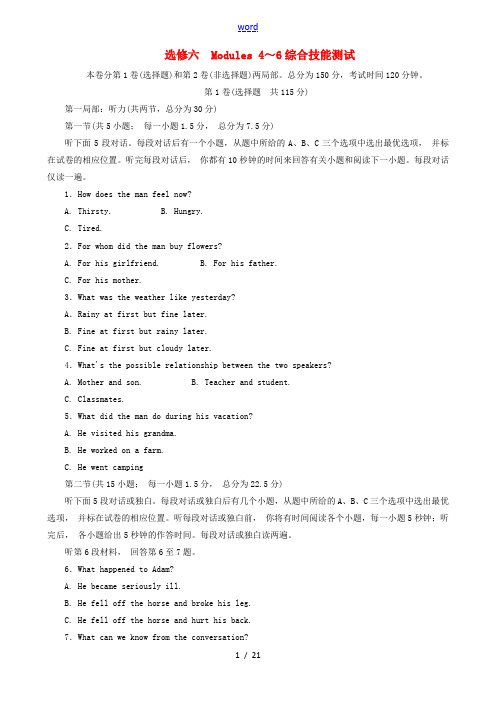sh盛伟book6 module4 An interview with Liu Fang说课ppt课件
外研版英语九年级上册Module4-6全部词汇详解课件(95页)可编辑全文

讲解:相当于 anyone。多用在疑问句、 否定句或条件状语从句中。 (anybody 作主语时,谓语动词 要用第三人称单数形式)
pron. 任何人
例句: Is there anybody who can tell a fairy tale?
拓展:miss 的其他用法: (1) vt. 怀念;思念 I do miss the children. (2) vt. 错过;没赶上;未击中
It’s the chance of a lifetime. You shouldn’t miss it.
(3) n.小姐;女士
Miss Zhang is our Chinese teacher. (miss 在此种用法中,首字母须大写, 且常用于未婚女士的姓氏前)
拓展: 反义词:downstairs adj. 位于 楼下的 adv. 往楼下;在楼下
n. 展览;展览会
例句: The photographs will be on exhibition until the end of the month.
n. 规则;法则
短语: break the rules 违反规定 follow the rules 遵守规定 例句: You shouldn’t break the
Module 4 Home alone
Unit 2 词汇课件
外研·九年级上册
v. 管理;支配
例句:The 30 years old man manages a big company by himself. 拓展: 1. v. 做成;(尤指)设法完成 2. manager n. 经理;管理者 例句: I found the manager and told him about the clerk’s kindness and patience.
Inside_view 视听说 Book 4 Unit 6 教学课件

Janet So none of the buildings we can see are really old?
Andy (2)_N_o__, _t_h_a_t_’s__n_o_t__w_h_a__t_I_’m___tr_y_in__g__to__s_a_y_. Er … The oldest part of the ancient Palace of Westminster is Westminster Hall, which dates back to the 11th century. (3) __It_w__o_u_l_d__a_p_p__e_a_r__th__a_t_____ it was used for entertaining, and as a court room.
2 the year the Houses of Parliament was completed _________________1_8_7_0___________________
3 the oldest part of the Palace of Westminster _______________W__e_s_t_m__in_s_t_e_r_H__a_ll__________
Houses of Parliament? 6 When does Andy think there are tours
of the Houses of Parliament? 7 What does Joe ask Andy to do? 8 What is Joe going to do?
4 Work in pairs and discuss the questions.
4 How is the government appointed? 5 Who is the head of government in the UK?
第六模块

Words and Expression in Module Two编者:崔扬校对人:杜照伟老师赠言:Studies serve for delight, for ornament, and for ability. -------Bacon, England读书可以使人心旷神怡,博采知识,增长能力。
(英)培根拓展:相关链接:need 教学目标:To grasp the usage of the words and expression in Module 2.教师点拔学案重点、难点:patient, dare, appreciate, admit, respect, make sure, wouldrather, prefer...to...内容设计1. patient adj._________________________ n.________________学习下列短语的用法并举例:be patient with_________________ be patient of sth._________________检测巩固:----What is he like?----He is patient _______ others and ________ hardships.A. with; ofB. with; toC. of; withD. to; with2.dare vt./ aux. ______________________________________________讨论dare作为实义动词的用法:讨论dare作为情态动词的用法:检测巩固:1)I wonder how he _________ that to the teacher.A. dare to sayB. dare sayingC. not dare sayD. dared say2)Faced with so many people, he _______ lift his head.A. didn't dareB. dared not toC. dares notD. daren't to3.appreciate vt._____________________________________________讨论作为动词的用法并举例:1)appreciate (one's)doing_______________2)I would appreciate it if... ___________________________3)appreciation n.________________4)注意:appreciate后不能接人作宾语。
【走向高考】高考英语一轮总复习 第三部分 Modules 4~6综合技能测试 外研版必修4

必修四Modules 4~6综合技能测试本卷分第1卷(选择题)和第2卷(非选择题)两局部。
总分为150分,考试时间120分钟。
第1卷(选择题共115分)第一局部:听力(共两节,总分为30分)做题时,先将答案标在试卷上,录音内容完毕后,你将有两分钟的时间将试卷上的答案转涂到答题卡上。
第一节(共5小题;每一小题1.5分,总分为7.5分)听下面5段对话。
每段对话后有一个小题,从题中所给的A、B、C三个选项中选出最优选项,并标在试卷的相应位置。
听完每段对话后,你将有10秒钟的时间来回答有关小题和阅读下一小题。
每段对话仅读一遍。
1.Where does the conversation probably take place?A.In a restaurant. B.In a supermarket.C.In the kitchen.2.What are the speakers talking about?A.The man's sister. B.A party.C.An actor.3.Who is going to work in Los Angeles?A.Sam. B.Betty. C.John.4.What will the man do next?A.Get the candle. B.Make a phone call.C.Hand in his report.5.What was the young man doing?A.Riding a bike. B.Driving a car.C.Crossing the road.第二节(共15小题;每一小题1.5分,总分为22.5分)听下面5段对话。
每段对话后有几个小题,从题中所给的A、B、C三个选项中选出最优选项,并标在试卷的相应位置。
听每段对话前,你将有时间阅读各个小题,每一小题5秒钟;听完后,各小题将给出5秒钟的作答时间。
每段对话读两遍。
新视野第二版Unit04 全部课文原文译文练习及答案

他们会教你以“有力的握手”问候他人,并且告诉你要用双眼注视对方。
肖胜文译文
他们教你跟人打招呼时用力握手,并告诉你要眼睛直视对方。
If you follow all this advice, you’lldrive everyone crazy– including yourself.
参考译文
参考译文无论是在与人交谈时在园艺俱乐部上发表演说时还是在求职面试中他们的表现都是一样的肖胜文译文无论是与人交谈还是在田园俱乐部发表演讲或参加求职面试他们都表现如一
Unit4
Preview
肖胜文译文
预览
Speech may be the most obvious way by which we communicate with each other, but it is not necessarily the most important.
肖胜文译文
不过,我们应该记住有效沟通的关键在于我们想表达什么,如果一个人言不由衷,即使掌握了所有体态语也不足以有效沟通。
So, try to use different means of communication together to express what we really want to. This will help us make a good impression on others.
参考译文
25年来,我在工作中和数千个想要成功的人打过交道。
肖胜文译文
25年来,我在工作中接触了几千名渴望成功的人士。
I’ve helped them makepersuasivepresentations, answer
---78---
unfriendly questions, communicate more effectively. The secrethas always beenyou are the message.
外研版Book6 Module4 Music 说课稿

教材分析 学情分析 目标分析
目录:
教法与学法
过程分析 效果分析 板书设计
教材分析
本模块以Music为话题,旨在通过模块教学使学生了解各 种东西方乐器,通过阅读一篇对中国著名演奏家刘芳的采 访报道了解中国古典音乐;学习表达情绪的功能句式,并 用这些句式表达对音乐的喜好; Teaching keys 教学重点 Learn new vocabulary about music and musical instruments. Deal with the comprehending exercises. Teaching difficulties 教学难点 Understand the characteristics of Chinese traditional music.
目标分析
Teaching aims(教学目标):
1. Target language 目标语言 To help students master some words, phrases, and expressions related to describing the music. 2. Ability goals 能力目标 Enable the Ss to learn about Chinese traditional music and musician Liu Fang. 3. Learning ability goals 学能目标 Enable the Ss to learn how to get specific information from an interview about Chinese traditional music and musician Liu Fang.
高二英语getting-along-with-others课件6-P

• 3.Because it shows that you care about others and think they are important.
• 4.We should not always try to fix their problems and give them advice. Sometimes we should just listen to them.
6. We don’t allow s_m_o__k_in_g (smoke) here. 7. We don’t allow students _t_o_s__m_o. ke
在allow, advise, forbid, permit等 动词后直接跟动词做宾语时,要用动 名词;如果有名词或代词做宾语,然 后再跟动词做宾语补足语, 其宾语补足语用带to的不定式。
him. 2. It is great fun _s_a_i_li_n_g (sail) a boat. 3. My job is _t_e_a_c_h_ ing (teach) English. 4. He enjoys _p__la_y__ing (play) the piano.
5. My job doesn’t include _m__a_k_i_ng(make) coffee for the boss.
8.My
car
needs
/
wants
/
requires
repairing
______
(repair).
动词need, want, require 作“需要”之 意时,其后跟动词作它的宾语时,必
须用动名词形式,或不定式的被动式。
这时,动名词的主动式表示被动意义。
高考英语总复习 Modules 4~6综合技能测试 外研版选修6

选修六Modules 4~6综合技能测试本卷分第1卷(选择题)和第2卷(非选择题)两局部。
总分为150分,考试时间120分钟。
第1卷(选择题共115分)第一局部:听力(共两节,总分为30分)第一节(共5小题;每一小题1.5分,总分为7.5分)听下面5段对话。
每段对话后有一个小题,从题中所给的A、B、C三个选项中选出最优选项,并标在试卷的相应位置。
听完每段对话后,你都有10秒钟的时间来回答有关小题和阅读下一小题。
每段对话仅读一遍。
1.How does the man feel now?A. Thirsty.B. Hungry.C. Tired.2.For whom did the man buy flowers?A. For his girlfriend.B. For his father.C. For his mother.3.What was the weather like yesterday?A.Rainy at first but fine later.B. Fine at first but rainy later.C. Fine at first but cloudy later.4.What's the possible relationship between the two speakers?A. Mother and son.B. Teacher and student.C. Classmates.5.What did the man do during his vacation?A. He visited his grandma.B. He worked on a farm.C. He went camping第二节(共15小题;每一小题1.5分,总分为22.5分)听下面5段对话或独白。
每段对话或独白后有几个小题,从题中所给的A、B、C三个选项中选出最优选项,并标在试卷的相应位置。
- 1、下载文档前请自行甄别文档内容的完整性,平台不提供额外的编辑、内容补充、找答案等附加服务。
- 2、"仅部分预览"的文档,不可在线预览部分如存在完整性等问题,可反馈申请退款(可完整预览的文档不适用该条件!)。
- 3、如文档侵犯您的权益,请联系客服反馈,我们会尽快为您处理(人工客服工作时间:9:00-18:30)。
态度;感受欣赏音乐给我们带来的快乐。
教学重点、难点
重点:1. 在语境中学习新词、短语猜测词义:
conservatory; soloist; repertoire; interpret;
tune; school; be true for/ of; it’s the same with;
While-reading
Careful-reading
part1:1.展示刘芳基本信息的表格,要求学生阅 读后填充。(获取基本信息,对预测进行反馈) 2.再次阅读寻找活动一中的句子,确定句 中代词所指代对象。 (微技能:细节寻查能力) 3.重点句型中词义猜测。
Part2:1. 阅读回答文中所提两个问题。 (小组合作概括问题答案)
give life to; make contact with. 2. 微技能训练:通过阅读文章了解某些代词
指代对象; 3. 通过标题概括文章大意; 4. 围绕音乐人物、利用所学表达练习说、写的
技能。 难点:1. 通过标题概括文章大意;
2. 围绕音乐人物、利用所学表达练习说、写 的技能。
Lead-in
key words on the blackboard.
(练习写作,总结概括所学)。
Reading for use
Work in groups to look for the information about PSY and do an interview. (呼应导入)
板书设计
An Interview with Liu Fang Traditional Chinese instrument Graduate Background:a child; 15; 1996 Challenges: respect but add Influences: tune Characteristics:firstly, secondly, thirdly; be true for Performing live:atmosphere Goals:wish to do
给学生一个真实的情景:一位5年级的小学生 问妈妈:“你听《江南style》吗?啊,实在 是太好听了!”播放这首歌,问学生的观点, 进一步提出问题:如果你有机会对鸟叔(PSY) 进行一个访问,你会问什么样的问题----How to do an interview with a musician.---导 入到标题。(激发学生兴趣—导入文章)
Firstly;secondly;thirdly.
(注意关键词使用) 2. further-thinking:中国古典音乐有什么样的 魅力?(进一步理解本段中有关中国古典音乐的 特征)(小组合作)
Part3:阅读回答文中所提两个问题。(自己概括)
Post-reading
1. Why do you think Liu Fang is successful? (情感价值观) ang following the
文章体裁:采访式的人物介绍 文章内容:以记者采访问答的形式、以刘芳
自己的口吻介绍了其音乐背景、遇到的挑战、 音乐理念以及目标等。中国传统音乐知识贯 穿其中。文章篇幅稍长,但结构清楚,难度 适中,无需教材重组。 课型:阅读课
学生分析
高二理科班学生。学生对音乐这个话题比较感 兴趣,尤其是流行音乐,了解也比较多。但很 少有学生对中国古典音乐有了解,而且几乎没 有学生知道刘芳是何许人。因此先以学生感兴 趣的流行音乐为切入,激发学生的兴趣,进而 阅读了解刘芳;
An Interview
with Liu Fang 说课
An Interview with Liu Fang
教材分析 学生分析 教学目标 教学重点、难点 教学方法与学习策略 教学步骤 板书设计
教材分析
文章标题:book6 module4 An Interview with Liu Fang
学生英语水平差距比较大,本篇文章对于后三 分之一的学生来说阅读起来困难较大,有一定 量的生词,授课班级不太活跃,所以有些地方 的阅读采取小组合作互助保证学生有所收获, 提高课堂气氛。
教学目标
语言知识目标:课文中呈现的有关音乐的词汇、 表达掌握。
语言技能目标:通过阅读语境识别词汇、短语 并推断其意义;读懂课文,学习寻查细节信息 以及概括大意;能够围绕音乐人物进行说、写 的活动。
